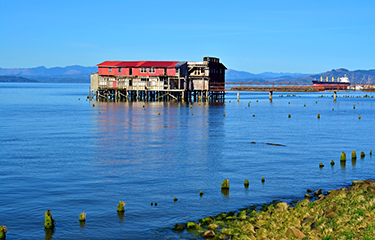New regulations in the U.S. state of Oregon are concerning local seafood processors, who are worried they will be forced to treat wastewater to be cleaner than drinking water.
The West Coast Seafood Processors Association (WCSPA) said in an issue brief the regulations will force many of its members to close unless the state legislature intervenes.
“The Environmental Protection Agency (EPA) exempts seafood processors from these types of extreme limits,” WCSPA said “No other state in the United States – nor any other country in the world – has applied these requirements to seafood processors. Without immediate action by government leaders, Oregon’s seafood and commercial fishing communities are in jeopardy.”
In response, the Oregon Department of Environmental Quality (DEQ) said it is working with individual seafood processors on incremental improvements and is not trying to shut down the facilities.
“It is not DEQ’s intention … to put any seafood processor out of business,” DEQ Water Quality Administrator Jennifer Wigel said in testimony last month.
The DEQ offers two types of permits: general and individual. General permits cover specific industries, ensuring equitable treatment of multiple companies and establishing standards that can be applied across the sector. With individual permits, DEQ comes in and considers unique circumstances to develop a permit. Traditionally, Oregon seafood processors have utilized general permits, the last of which was issued in 2006. In 2015, DEQ began revising a new general permit, introducing it in 2020.
Seafood processors are not happy with the new regulations.
“DEQ’s new permit regime is the unfortunate and frustrating outcome of many years of effort and engagement by our industry and our coastal legislators to work to develop permit conditions that will protect the environment and public health without imposing unnecessary and substantial economic harm to Oregon’s coastal communities,” WCSPA Executive Director Lori Steele testified to state legislators last month. “Currently, the new permits are exceedingly complicated, overly restrictive, and they are not tailored to our processing operations or the very limited environmental impacts associated with our industry.”
The WCSPA claims it is impossible to install new treatment facilities that can meet the water-quality levels laid out by DEQ, which the agency disputes.
“We think that there continues to be space between where the facilities operate today and … technology [that is] unachievable or unavailable,” Wigel said.
Wigel said the department is working with processors on individual compliance timelines and incremental improvements based on what is economically and technologically achievable.
Among the WCSPA’s concerns is that DEQ is putting the burden on seafood processors to remove chemicals and substances from seawater that they’re not putting in, such as chlorine, ammonia, and bacteria.
According to Rian Hooff, a policy and legislative analyst for the department, the issue is concentration. While all of those substances may be present in ocean water already from other sources, they may be concentrated at seafood-processing facilities, and DEQ needs to ensure that those concentrated materials aren’t put back into the water at harmful levels.
With concerns over the general permit, seafood processors have applied for individual permits. However, the WCSPA argues that individual permits also have been excessively restrictive and onerous on their businesses. For example, the WCSPA claims the individual permits have introduced restrictive limits on metals like copper, mercury, and nickel, although Wigel has disputed that claim, noting that while DEQ has asked for monitoring of metals, it has not established explicit limits at this time.
The WCSPA is calling on Oregon legislators to take action and fix the issues in the permit standards. Lawmakers did hold an informational hearing on the issue in April but have yet to take action.
Photo courtesy of Shutterstock / Norman Ong







